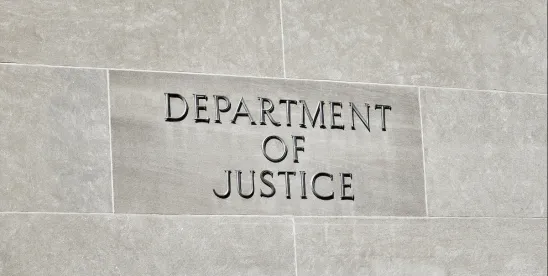“The Criminal Division is turning a new page on white-collar and corporate enforcement.” So pronounced the head of the US Department of Justice (DOJ) Criminal Division, Matthew Galeotti, in a recent speech rolling out several new policies regarding central elements of DOJ’s approach to corporate enforcement, including self-disclosure, whistleblowers, and corporate monitorships.1
In a new enforcement plan titled “Focus, Fairness, and Efficiency in the Fight Against White-Collar Crime” (Enforcement Plan) and addressed to all Criminal Division personnel,2 Galeotti sets out several areas of focus for the Criminal Division that align with the Trump administration’s already-announced priorities and introduces some key process changes. The Enforcement Plan also recognizes the significant costs and intrusions that accompany federal probes and emphasizes the need for prosecutors to take all reasonable steps to minimize the length and impact of such investigations.
To that end, the Enforcement Plan introduced three particularly significant policy changes. First, and most meaningful, the Enforcement Plan unveiled an updated Corporate Enforcement and Voluntary Self-Disclosure Policy (CEP)3 that provides a path to guaranteed declinations or non-prosecution agreements (NPAs). The intention is apparent: DOJ is continuing its emphasis on self-disclosure, cooperation, and remediation. To spur more self-disclosures, DOJ is offering “carrots” that are bigger and more definite, so that companies know what to expect when they make the decision to call DOJ. Second, the new policies also broaden the conduct covered by the Corporate Whistleblower Awards Pilot Program to cover key administration priorities, such as immigration, transnational criminal organizations (TCOs), sanctions, and tariffs.4 And, third, revised policies now limit the imposition of burdensome compliance monitorships as part of corporate criminal resolutions.5
Focus Areas
The Enforcement Plan directs the Criminal Division to be “laser-focused on the most urgent criminal threats to the country” and identifies 10 “high-impact areas” that will be prioritized in investigating and prosecuting white-collar crimes. These include some long-standing categories as well as some that align with the Trump administration’s earlier-stated goals. They include the following:
- Waste, fraud, and abuse, including healthcare fraud and federal program and procurement fraud.
- Trade and customs fraud, including tariff evasion.
- Fraud in connection with “variable interest entities” (VIEs), defined as typically Chinese-affiliated companies listed on US exchanges.
- Investment fraud.
- National security threats and material support to foreign terrorist organizations, cartels, and TCOs.
- Money laundering offenses.
- Violation of federal drug control laws, including as they relate to fentanyl and opioids.
- Bribery that impacts US national interests, national security, or competitiveness of US businesses.
- Crimes involving digital assets.
The Enforcement Plan also specifies that the Criminal Division will focus on compensating victims and prioritizing schemes that involve senior-level personnel, demonstrable loss, and efforts to obstruct justice—in particular where that harm impacts US citizens.
New Paradigm for Self-Disclosure: Definite and Clear Benefits
In an effort to “transparently [describe] the benefits that a company may earn through voluntarily self-disclosing misconduct,”6 the Criminal Division now guarantees that it will offer a company a declination so long as it meets the following four factors:
- The company voluntarily self-discloses misconduct that is not previously known to DOJ, prior to imminent threat of disclosure, and within a reasonably prompt time after the company becomes aware of it;
- The company fully cooperates with the Criminal Division’s investigation;
- The company timely and appropriately remediates the misconduct; and,
- There are no “aggravating circumstances” related to the nature and seriousness of the offense, egregiousness or pervasiveness of the misconduct, severity of the harm, or a prior criminal resolution within the last five years based on similar misconduct.
This assurance of a declination replaced the predecessor version of the CEP, which only offered the “presumption” of a declination under those same factors. Now, assuming the company meets these factors, DOJ will enter into a declination, though the company will still be required to pay all disgorgement and forfeiture, as well as restitution to any victims, and the declination will be made public.
Even when a company does not meet all four criteria for a guaranteed declination, the new policy has defined benefits for what it calls “near miss” scenarios—i.e., those where a company self-disclosed after the government became aware of the conduct or where aggravating factors are present. In such circumstances, companies are promised significant self-disclosure benefits: an NPA with a term fewer than three years, a 75% reduction from the low end of the fine range, and avoidance of a corporate monitor.
Finally, for companies that make no self-disclosure, their full cooperation and remediation may still earn cooperation credit in the discretion of the prosecutor, which may include the form of the resolution, its term, a reduction in the monetary penalty (not to exceed a 50% reduction in the guidelines range), and whether to impose a corporate monitor.
To aid companies as they navigate these benefits, the CEP now includes the following flow chart:
.png)
Source: 9-47.120 - Criminal Division Corporate Enforcement and Voluntary Self-Disclosure Policy
An Expanded Whistleblower Pilot Program
The Criminal Division also renewed its commitment to the Corporate Whistleblower Awards Pilot Program, originally unveiled under the last administration, with some modifications, primarily in terms of the types of matters covered, to align them with the Enforcement Plan’s areas of focus.
The three-year pilot program, launched in August 2024, was designed to offer significant payouts to tipsters who provide information on certain frauds that lead to asset forfeitures above US$1 million. While the mechanics of the program remain largely unchanged—including a 120-day window to self-disclose and receive the full benefits of the CEP, even if a whistleblower reported the same allegations to the government—the updated policy adds to its coverage matters in areas that the Trump administration has repeatedly highlighted as areas of priority. These priority areas include: procurement and federal program fraud; trade, tariff, and customs fraud; violations of federal immigration law; violations involving sanctions; and material support of foreign terrorist organizations, cartels, or TCOs, including money laundering, narcotics, and Controlled Substances Act violations. Notably, the program continues to include within its scope violations related to foreign corruption and bribery, including violations of the Foreign Corrupt Practices Act (FCPA) and Foreign Extortion Prevention Act (FEPA).
Monitors Reserved for Egregious Cases
As for independent compliance monitors, they will be fewer and far between, with the new policy noting that the value they add is often outweighed by the substantial costs and distractions that they impose on a company. DOJ now lists several criteria it will evaluate to ensure that an independent monitor will only be imposed when necessary and if the potential benefits justify the significant costs and burden.
In the “limited” circumstances when an independent compliance monitor is imposed, the DOJ will ensure that the monitorship is appropriately tailored, right-sized to the conduct, and focused on bringing the company back into good standing, where it can prevent future misconduct. To that end, DOJ will now require a fee cap, oversee budgets and workplans, and impose regular meetings with the Criminal Division.
Key Takeaways
These policy announcements reveal a much-anticipated shift by the Trump administration toward a corporate enforcement approach that recognizes and places greater emphasis on the practical impacts that DOJ actions have on corporations. By providing clearer guidelines and guaranteed benefits from self-reporting and cooperation—while limiting some of the more burdensome and costly penalties—DOJ is explicitly trying to adjust the carrot-and-stick calculations for companies that may encounter potential misconduct within their ranks. All companies active within the United States must carefully consider the ways that these policies change the risk environment.
Importance of Professional Internal Investigations
Conducting a focused, efficient, and credible internal investigation soon after allegations of misconduct arise remains as important as ever. To obtain the benefits of the revised CEP, including a certain declination or NPA, a company must self-disclose within a reasonably prompt period, which necessarily means that the company needs to know what the issue is and assess whether it warrants a disclosure. Moreover, with the renewed and expanded whistleblower incentives, if someone reports the misconduct both internally and to DOJ, there is only a 120-day window for the self-disclosure to satisfy the CEP requirements. In short, when an allegation arises that may reflect a federal criminal issue, a timely and professional investigation into the matter may yield substantial benefits.
Continue to Assess Compliance Programs
The DOJ announcements recognize the important role that US corporations have and that an effective compliance program is the “first line of defense” against misconduct.7 Such programs should include avenues for internal reporting and investigation of allegations, so that companies are well-positioned to benefit from the enhanced benefits under the CEP. Companies should also consider the “areas of focus” noted in the Enforcement Plan and how their compliance program addresses them, as applicable to the particular circumstances of their business. Consideration should be made to whether programs should now go beyond the historical areas of focus, such as antibribery and conflicts of interest, to policies, procedures, and trainings that cover sanctions, export controls, tariff compliance, and ensure companies avoid any connections to TCOs and cartels.
Carefully Evaluate Self-Disclosure Decisions
Although the “carrots” offered by DOJ are now clearer, more beneficial, and more predictable, decisions on whether, when, and how to self-disclose are always complex and involve many considerations. The prospect of a declination or NPA is attractive and now more apparent, but other consequences remain from self-disclosure in addition to the criminal fines and restitution, including ancillary litigation, business, and reputational risks. Decisions regarding self-reporting should be soberly reviewed with counsel.







 />i
/>i
